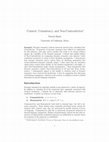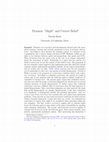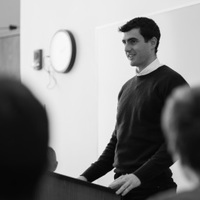Published Articles by Patrick Skeels

Australasian Journal of Philosophy, 2024
Synopsis: Dynamic semantics violates numerous classical laws, including Non-Contradiction. Propon... more Synopsis: Dynamic semantics violates numerous classical laws, including Non-Contradiction. Proponents of dynamic semantics have offered no explanation for this behavior, and some critics consider this result to be strong evidence against the tenability of the dynamic program. I defend and explain failures of Non-Contradiction by comparing dynamic semantics and classical, truthconditional semantics in terms of their idealizing assumptions. I demonstrate that dynamic semantics rejects context fixity, an idealizing assumption that truth-conditional semantics typically adopts. I then argue that any semantics which rejects context fixity should, by the classical semanticist's own lights, violate Non-Contradiction under certain circumstances. I then demonstrate that dynamic semantics violates Non-Contradiction in all and only those circumstances. I subsequently appeal to this insight to vindicate some of dynamic semantics' more controversial predictions. I close by suggesting that discussion of idealizing assumptions, common in the sciences, is similarly crucial to fruitful discussion in natural language semantics.

Inquiry: An Interdisciplinary Journal of Philosophy
Veltman’s test semantics and developments thereof reject the canon about semantic contents and at... more Veltman’s test semantics and developments thereof reject the canon about semantic contents and attitude ascriptions in favor of dynamic alternatives. According to these theories the semantic content of a sentence is not a proposition, but a context change potential (CCP). Similarly, beliefs are not taken to be relations between agents and propositions, but agents and CCPs. These deviations from the canon come at the cost of an elegant explanation about the correctness of belief. Standardly, it is taken that the content of a belief is correct just in case the content of that belief is true. The proponent of the test semantics cannot appeal to this explanation since they hold that certain contents, namely epistemically modalized contents, do not express propositions, and are neither true nor false. After motivating the need for an account of the correctness of belief within the dynamic framework, I argue that the few extant accounts in the literature are unsatisfactory. A novel account is proposed that avoids the problems of competing views.
Studies in History and Philosophy of Science: Part A, 2020
This paper considers Norton’s Material Theory of Induction. The material
theory aims inter alia t... more This paper considers Norton’s Material Theory of Induction. The material
theory aims inter alia to neutralize Hume’s Problem of Induction. The purpose of the paper is to evaluate the material theory's capacity to achieve this end. After pulling apart two versions of the theory, I argue that neither version satisfactorily neutralizes the problem.
Conferences I've Run by Patrick Skeels










Uploads
Published Articles by Patrick Skeels
theory aims inter alia to neutralize Hume’s Problem of Induction. The purpose of the paper is to evaluate the material theory's capacity to achieve this end. After pulling apart two versions of the theory, I argue that neither version satisfactorily neutralizes the problem.
Conferences I've Run by Patrick Skeels
theory aims inter alia to neutralize Hume’s Problem of Induction. The purpose of the paper is to evaluate the material theory's capacity to achieve this end. After pulling apart two versions of the theory, I argue that neither version satisfactorily neutralizes the problem.